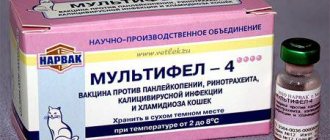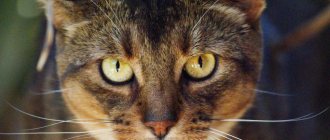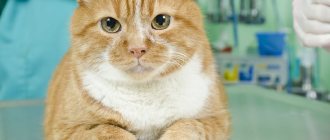Basic kitten vaccination
The most dangerous period for kittens is the period from 6 to 16 weeks, when the immunity inherited from the mother cat gradually disappears, and their own immune system is not yet fully functioning. Therefore, the first vaccination of Sphynx kittens is carried out no earlier than the 6th week of life, but no later than the 16th.
The little sphinx is vaccinated twice with an interval of 3-4 weeks. Next, the pet is vaccinated once a year.
Important! 10 days before vaccination, anthelmintic treatment must be done.
When buying a kitten, you need to make sure that he has received all the necessary vaccinations. If not, then you need to make them. If there are other cats living in the house, then a 10-day quarantine is arranged for the new pet, since after vaccination the kitten is actually a carrier of a weakened virus.
The basic vaccination schedule for a Sphynx kitten is shown in the table.
| Age | Required vaccines |
| 6–8 weeks | from rhinotracheitis (FVR), panleukopenia (FPV), calcivirosis (FCV) |
| 12 weeks | ELISA test (if it turns out to be negative, then they give the leukemia vaccine) + first revaccination FVR, FPV, FCV |
| 16 weeks | against rabies + revaccination against leukemia + second revaccination FVR, FPV, FCV |
| 16 months | FVR, FPV, FCV, leukemia, rabies (and then the same every year) |
What diseases need to be vaccinated against?
There are basic (recommended) vaccines for major diseases and additional ones used by choice or necessity. Vaccination against panleukopenia viruses, herpesvirus (viral rhinotracheitis), calicivirus and rabies is considered basic for all cats (rabies vaccination is mandatory for the Russian Federation).
Additional vaccinations include vaccinations against feline leukemia virus, feline immunodeficiency virus, bordetellosis and feline chlamydia. The choice of necessary vaccines is made depending on the lifestyle of the cat - it is estimated how many animals are kept in the house, whether the pet goes for walks on the street, goes to the country, or is it even a stud cat. Typically, a veterinarian recommends one or another vaccination option after a conversation with the animal owner.
Preparing for vaccination
Preparation is not an empty measure, but a way to prevent complications. Only healthy and developed Sphynx kittens are vaccinated. Vaccination is unacceptable if the pet is malnourished or, conversely, obese. First you need to bring the animal's weight back to normal.
Vaccination is prohibited if the Sphynx is sick, has a cold, coughs, sneezes, or has a fever. The procedure is postponed until the pet recovers. Do not vaccinate a kitten during the period of teeth change.
The vaccine is given to the kitten by a veterinarian. Before the procedure, he checks the physical condition of the animal and performs a stool analysis. If the Sphynx is sick, infected with helminths, then the veterinarian will prescribe treatment.
To carry out anthelmintic treatment before vaccination, use drugs sold in a veterinary pharmacy. The following tools are suitable:
- tablets - “Azinox”, “Drontal”, “Prasitab”;
- liquid – “Profender”, “Advocate”;
- sweets – “Poliverkan”;
- suspension – “Drontal Junior”, “Prasicide”;
- paste - "Dirofen".
Vaccinations for adult Sphynx cats
Adult Sphynx cats should be vaccinated once a year.
Attention! Old animals that have reached 8–10 years of age are not vaccinated if vaccination has never been carried out before.
For panleukopenia (plague, FPV)
Two types of vaccines are used:
- containing suppressed or killed virus;
- based on an active virus that has been modified.
They are vaccinated against panleukopenia in combination with injections against viral respiratory infections. Revaccination is done once every 2 years, but preferably every year.
Source
Vaccination schedule for Sphynx kittens
Online store of veterinary drugs
Vaccinations for Sphynx , as well as vaccinations for Sphynx (with different types of fur, or rather hairlessness), begin at 2 months, are revaccinated after 3-4 weeks, and complete the cycle at 1 year. Although you can start according to an earlier scheme. This depends on whether the mother was vaccinated in a timely manner, whether she had enough milk and until what time she fed the lambs so that antibodies would be passed on to the babies.
What vaccinations Sphynx ? Against chlamydia, panleukopenia, calcivirus, rhinotracheitis, rabies. This is a list of the main dangerous diseases, especially for a growing organism, which, when infected, in the vast majority of cases lead to death. And even pets who live only at home, that is, who do not leave the apartment, are susceptible to them.
Before vaccinating sphinx kittens , you need 12-14 days:
· treat for fleas; due to the characteristics of the breed, there may not be many of them, but they may well affect the animal - mainly on the face, armpits (drops on the withers Hartz, Stronghold, Frontline spray)
· deworming, even if there are no obvious signs of parasites, there is almost always a hidden carriage that needs to be eliminated (Profender, Drontal, Polyvercan, Prazicide suspension)
· strengthen the body’s nonspecific defense with an immunomodulator (Roborante, Mastim, Fosprenil, Microvitam)
On the appointed day, thermometry and examination are carried out, and only if the kitten is completely clinically healthy, then it is vaccinated. What care does he need in the post-vaccination period? It is important to exclude:
· any walks and contacts with other cats and female cats
· keep him away from family members’ outdoor shoes, door mats, etc.
Avoid drafts and hypothermia
· do not introduce new foods or additives into the diet
· reduce his activity, do not play with him, but rather create a calm, non-nervous environment
What kind of vaccinations Sphynx ? Nobivak Quadriquet or Triquet, Multifel, Biofel . After them, minimal side effects are observed, they are safe and effective, immunity is developed quickly and has a long-lasting effect.
The information that Sphynx kittens have been vaccinated, the name, series, number of the vaccine, and the date are entered by the veterinarian into the animal’s passport, which will be required when traveling abroad, when participating in exhibitions, or when breeding.
Source
Advantages and disadvantages
Polio vaccination is usually given in infancy as part of basic immunization, along with the other five routine vaccinations. Poliomyelitis is a serious infectious disease, which in its development stage leads to disability if the gray matter of the spinal cord is damaged. Benefits of polio vaccination:
· allows you to avoid infection and prevent disability, skeletal deformities and paralysis;
· the vaccinated person develops immunity from the disease, so even if infected, the child will tolerate the disease much easier;
· Adverse reactions after vaccination are mostly absent.
Many believe that the vaccine has shortcomings that result in the development of the disease polio. But the probability of such an outcome is no more than 1 case in 2.7 million people.
Vaccination is not dangerous to the life and health of the child. The goal is to protect against future infection by creating a barrier against infection. The most harmless is the inactive vaccine.
Vaccination calendar for kittens and cats
If you decide to have a kitten as a pet, you should be aware that, in addition to great joy, it is also a huge responsibility.
A caring owner carefully monitors the health of his pet and takes all preventive measures to ensure that the animal is maximally protected from contracting various infections. The following are used as preventive methods to combat infectious diseases:
- vaccination of animals;
- avoiding contact with street cats;
- excluding the presence of an unvaccinated animal on the street;
- maintaining careful hygiene of the premises.
Vaccination of cats is a method that provides a high percentage of guarantee that your animal will not become infected with a serious disease, or, if infected, the disease will be easier and without complications.
Are there any complications or side effects?
In most cases, vaccination is tolerated without any changes in health or behavior. In rare cases, allergic reactions are observed, so it is very important to get vaccinated at a veterinary clinic and carefully monitor the cat in the first hours and days after the vaccine is administered.
Although very rare, post-injection sarcoma can develop at the site of vaccine administration. The reasons for the development of this complication have not been definitively established, however, it is believed that the inflammatory reaction at the site of administration of medications (including vaccines) can lead to cell degeneration and tumor formation; it is possible that there is a genetic predisposition to the occurrence of such a reaction. To reduce risk, it is recommended that vaccines be administered at different sites.
Cat owners should closely monitor their pets and contact a veterinarian if a lump or mass is observed at the injection site of a vaccine or drug that either increases in size, is larger than 2 cm, or persists for more than 3 months from the date of injection.
When and how many times should cats be vaccinated?
Vaccinated cat kittens have innate immunity during the first 9-12 weeks of life, but after that they are at increased risk because their immune systems are still immature. It is recommended that kittens be vaccinated for the first time at approximately 8 weeks, and again after 3-4 weeks. This schedule will allow you to overcome the reaction of maternal antibodies and develop your own immunity. After this, the kittens can be given to new families.
It is believed that revaccination of an animal should be carried out annually. But veterinarians emphasize that this issue should be approached strictly individually. The same vaccine affects different animals differently. It depends on the cat’s age, general health, and whether the cat has any diseases.
All these factors affect the duration of protection, so after examining the animal, the specialist will make recommendations on a vaccination plan specifically for your pet.
Rabies is the only disease for which cats must be vaccinated annually, regardless of any condition.
Thus, the vaccination schedule for cats will look like this:
| Age at which vaccination is given against: | First vaccination | Revaccination | Repeated vaccination |
| Panleukopenia Chlamydia | at 8-9 weeks | 3-4 weeks after the first vaccination | on the recommendation of a veterinarian |
| Rabies | at 12-13 weeks | annually |
The reasons why an animal that has been vaccinated may become infected with an infectious disease are as follows:
- violation of the vaccination schedule;
- presence of concomitant disease;
- use of certain medications;
- prolonged stress;
- presence of parasites.
All these factors reduce immunity, which can result in infection, so it is especially important to take them into account and get vaccinated on schedule.
Acne, pimples and other manifestations in cats
Did you know that this breed can develop acne during puberty? This is due to the sebaceous glands of the animal’s skin; most often, pimples can be seen on the back, belly and tail, and it is possible that they may appear on other parts of the body. Hereditary factor is the main reason for the appearance of these rashes. The so-called risk zone includes: blue, red and cream colors.
This breed has another health problem, many kittens of this breed often have watery eyes. This can be either a simple allergy to something or an infectious disease. To determine why your animal's eyes are watering, you need to contact a veterinarian. Infections such as conjunctivitis are common in this breed and cause watery eyes very often. In this case, long-term treatment and constant prevention of the animal are required.
Allergies can also manifest themselves, for example, to household chemicals. Dust, as well as pollen from plants, cannot be ruled out either. In the long-haired variety of the breed, allergies may occur due to the long hair. Since allergies can manifest themselves for many reasons, you should seek help from a specialist who can help you understand this issue.
How to prepare for vaccination and what to vaccinate cats against?
Before vaccination, it is necessary to treat the cat against worms and fleas. After deworming and getting rid of ectoparasites, after 10-14 days you can go for vaccination.
Veterinarians do not recommend vaccination if:
- the kitten's teeth change (at 4-6 months);
- the animal underwent surgery less than 4 weeks ago;
- the cat is pregnant or nursing kittens;
- the animal has a weakened immune system;
- mating is planned;
- the cat came into contact with a sick animal.
The most dangerous infections for cats are:
- calcivirus infection is very contagious and dangerous for young individuals, often leading to death;
- panleukopenia is a less contagious, but very serious disease with a high mortality rate in animals;
- herpes viral rhinotracheitis is an infection that is severe and accompanied by serious complications;
- chlamydia is an infection that affects the cornea of the eyes, respiratory and reproductive organs, which can be transmitted from a cat to a person;
- rabies is a disease that causes severe damage to the nervous system, often leading to death, and is very dangerous for humans.
Strains of these particular diseases are included in polyvalent vaccinations: “Novibak”, Holland; "Purevax" and "Feligen" France.
If you use high-quality products and follow the vaccination schedule recommended by your doctor, your furry purrs will be healthy and vigorous for many years!
Interesting topics
What else to read:
- How to put a collar on a cat From time immemorial, a collar has been associated exclusively with a dog. Yes, even now.
- Treatment of ascites in cats Contents of the article Why ascites develops Clinical picture Diagnosis in a veterinary clinic Is ascites in cats treated or not? What.
- What does it mean if a cat’s urine begins to smell strongly Contents of the article Causes Accompanying symptoms Diagnosis in a veterinary clinic Treatment method and prognosis What to do at home Possible.
- Reasons why a cat drools Contents of the article Pathology or part of the norm Conditions and diseases that cause increased secretion.
© Veterinary clinic "Belanta", 2004—2021, Moscow
How does pregnancy and childbirth proceed?
Sphynx cats tolerate pregnancy well and give birth on their own; their instinct is excellent, which is very valuable. Kittens are born full term, grow well and develop well. Naturally, for the pregnancy to be successful, it is necessary to take care of the cat from the first days, then the birth will take place without complications.
Here are some tips for preparing for childbirth
- In order for your cat to give birth to healthy kittens, you need to give birth in comfortable conditions. Therefore, as soon as the cat becomes pregnant, you need to take care of her birth place. You can prepare a cardboard box and cover it with a sheet to make it more comfortable for the kittens to be there.
- If the birth is already close, you need to prepare the necessary things that will be useful to you, this is a heating pad, it will need to be filled with warm water, a second diaper, sterile scissors. Even if your cat's pregnancy went smoothly, delivery can still be complicated, so you need to be prepared for anything.
- If you notice that your cat has begun to eat poorly and hide in inaccessible places, you should know that your cat is already in the last stage of pregnancy. Perhaps this behavior indicates the cat is having contractions. Therefore, if you notice that the animal is not behaving as usual, it is better to play it safe and try to move it into a box. But this must be done carefully and carefully so that the animal does not get scared, otherwise she will not give birth there.











